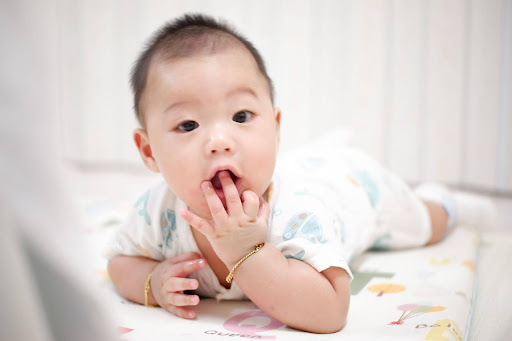Parent’s Guide to Preventing Middle Ear Infections in Children
Ever stayed up with a toddler who keeps pulling at their ear? The ache starts, and nobody can sleep. It happens. Ear infections often look like a simple cold until they don’t, and suddenly your little one is really uncomfortable.
Here’s the easy version of why it happens: kids have shorter, narrower and more horizontal eustachian ear tubes (tubes that connect the nose to the ear), so fluid gets trapped. Add daycare germs, and infections are more likely to occur. Even after the infection clears, leftover fluid can cause muffled hearing for a while. If your child seems to “ignore” you, it might be due to this or simply classic three-year-old behavior.
What can parents actually do?
1) Hold the baby on her back when feeding.
During breast feeding or bottle feeding, hold the baby in an upright position. Babies can develop infections by having milk enter their ears when lying flat while taking milk. This is a big difference in a small change.
2) Keep everything clean
Hands should be washed frequently, toys and surfaces should be cleaned, and pillowcases should be changed often. It is not a fun job, but being clean will also result in fewer colds and fewer ear issues. Having cleaning wipes on hand would be helpful for quick cleanups.
3) Do not smoke and keep the air clean.
Cigarettes should not be smoked in the presence of your baby. Even a few minutes are enough to irritate his nose and ear canals. Ventilate your house by opening the windows when you cook. Since you may have pets or a dusty home, consider vacuuming more frequently than you would otherwise. The ears of your baby will be grateful.
4) Use pacifiers wisely
Pacifiers may save lives, particularly at night, but when worn throughout the day, they put the child at risk of ear infections. Wear them when you feel like it, not every day.
5) Deal with congestion and allergies.
When their noses are stuffy, ear problems are aggravated by the fact that it stuffs up the small tubes in their ears. Nose drops using saline, a cool-mist humidifier, and clean stuffed animals. If your baby is allergic to dust or pet hair, consult your doctor to discuss treatment options.
6) Stay up-to-date with vaccines
The vaccines can prevent numerous germs that are usually the cause of ear infections. Vaccinate according to your doctor’s schedule this is one of the most effective methods to avoid ear problems before they occur. Consult a paediatrician for your scheduled vaccination.
When to See a Specialist

So, where do experts enter the picture. If your child has repeated infections, persistent earaches, or fluid that is not clearing, it will be worthwhile to get a specific opinion. An ENT specialist who specializes in paediatric sees the big picture and plans your course of action, which may include watchful waiting, medication, or procedures such as small ventilation tubes (also known as grommets) to clear the fluid.
When problems with your child’s ears keep re-entering your life a specific ear exam can repay you in terms of second-guessing. An ear specialist doctor can be particularly useful there. It won’t hurt to have a specialist check your hearing, fluid, and have a clear plan on what to do, so you don’t get stuck with an undecided outcome if it will just go away this time.
Few Final Tips
- Just as you plan snacks: have saline in the house, a humidifier charged, and tissues readily available.
- Daycare bag checklist: spare shirt, wipes, hand gel, mini tissue pack.
- Track patterns. If you experience pain in the ear after each cold or dust exposure, make a note. Patterns encourage your doctor to find the solution more quickly.
Parenting is challenging enough without ear infections causing extra stress. You can reduce the stress and make those little ears happier with a few simple adjustments, with some tweaking and the appropriate support when needed.
FAQS
- What are the signs of an ear infection in young children?
Common signs include ear pain, irritability, fever, trouble sleeping, tugging at the ear, and temporary hearing loss. If symptoms persist or worsen, consult a doctor.
- How can I prevent ear infections in my child?
Keep your child’s head upright during feeding, maintain good hygiene, avoid exposure to smoke, limit pacifier use, manage allergies, and ensure vaccinations are up to date.
- When should I see a doctor for my child’s ear infection?
If symptoms last more than 48-72 hours, the child is under 6 months old, or there’s a high fever, severe pain, or drainage from the ear, it’s time to consult a doctor.
- Can ear infections affect my child’s hearing?
Yes, lingering fluid from an ear infection can temporarily affect hearing. If your child seems to ignore sounds or is having trouble speaking, it may be due to fluid buildup in the ear.
- How are recurring ear infections treated in children?
For recurring infections, treatment options may include antibiotics, pain relievers, or in some cases, the placement of ventilation tubes (grommets) to help drain fluid and prevent further infections.
Discover more from The ENT Doctor
Subscribe to get the latest posts sent to your email.


Comments are closed